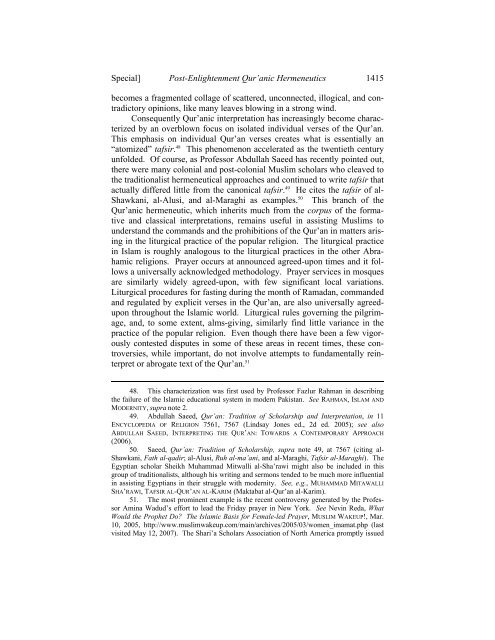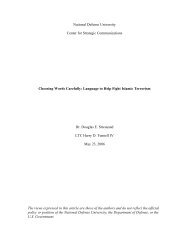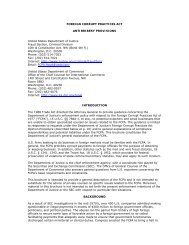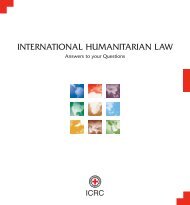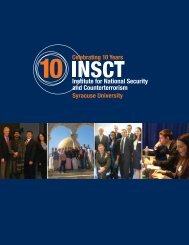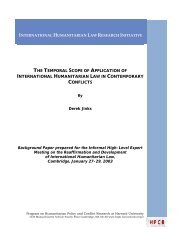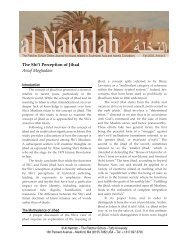some reflection on post-enlightenment qur'anic hermeneutics
some reflection on post-enlightenment qur'anic hermeneutics
some reflection on post-enlightenment qur'anic hermeneutics
Create successful ePaper yourself
Turn your PDF publications into a flip-book with our unique Google optimized e-Paper software.
Special] Post-Enlightenment Qur’anic Hermeneutics 1415becomes a fragmented collage of scattered, unc<strong>on</strong>nected, illogical, and c<strong>on</strong>tradictoryopini<strong>on</strong>s, like many leaves blowing in a str<strong>on</strong>g wind.C<strong>on</strong>sequently Qur’anic interpretati<strong>on</strong> has increasingly become characterizedby an overblown focus <strong>on</strong> isolated individual verses of the Qur’an.This emphasis <strong>on</strong> individual Qur’an verses creates what is essentially an“atomized” tafsir. 48 This phenomen<strong>on</strong> accelerated as the twentieth centuryunfolded. Of course, as Professor Abdullah Saeed has recently pointed out,there were many col<strong>on</strong>ial and <strong>post</strong>-col<strong>on</strong>ial Muslim scholars who cleaved tothe traditi<strong>on</strong>alist hermeneutical approaches and c<strong>on</strong>tinued to write tafsir thatactually differed little from the can<strong>on</strong>ical tafsir. 49 He cites the tafsir of al-Shawkani, al-Alusi, and al-Maraghi as examples. 50 This branch of theQur’anic hermeneutic, which inherits much from the corpus of the formativeand classical interpretati<strong>on</strong>s, remains useful in assisting Muslims tounderstand the commands and the prohibiti<strong>on</strong>s of the Qur’an in matters arisingin the liturgical practice of the popular religi<strong>on</strong>. The liturgical practicein Islam is roughly analogous to the liturgical practices in the other Abrahamicreligi<strong>on</strong>s. Prayer occurs at announced agreed-up<strong>on</strong> times and it followsa universally acknowledged methodology. Prayer services in mosquesare similarly widely agreed-up<strong>on</strong>, with few significant local variati<strong>on</strong>s.Liturgical procedures for fasting during the m<strong>on</strong>th of Ramadan, commandedand regulated by explicit verses in the Qur’an, are also universally agreedup<strong>on</strong>throughout the Islamic world. Liturgical rules governing the pilgrimage,and, to <str<strong>on</strong>g>some</str<strong>on</strong>g> extent, alms-giving, similarly find little variance in thepractice of the popular religi<strong>on</strong>. Even though there have been a few vigorouslyc<strong>on</strong>tested disputes in <str<strong>on</strong>g>some</str<strong>on</strong>g> of these areas in recent times, these c<strong>on</strong>troversies,while important, do not involve attempts to fundamentally reinterpretor abrogate text of the Qur’an. 5148. This characterizati<strong>on</strong> was first used by Professor Fazlur Rahman in describingthe failure of the Islamic educati<strong>on</strong>al system in modern Pakistan. See RAHMAN, ISLAM ANDMODERNITY, supra note 2.49. Abdullah Saeed, Qur’an: Traditi<strong>on</strong> of Scholarship and Interpretati<strong>on</strong>, in 11ENCYCLOPEDIA OF RELIGION 7561, 7567 (Lindsay J<strong>on</strong>es ed., 2d ed. 2005); see alsoABDULLAH SAEED, INTERPRETING THE QUR’AN: TOWARDS A CONTEMPORARY APPROACH(2006).50. Saeed, Qur’an: Traditi<strong>on</strong> of Scholarship, supra note 49, at 7567 (citing al-Shawkani, Fath al-qadir; al-Alusi, Ruh al-ma’ani, and al-Maraghi, Tafsir al-Maraghi). TheEgyptian scholar Sheikh Muhammad Mitwalli al-Sha’rawi might also be included in thisgroup of traditi<strong>on</strong>alists, although his writing and serm<strong>on</strong>s tended to be much more influentialin assisting Egyptians in their struggle with modernity. See, e.g., MUHAMMAD MITAWALLISHA’RAWI, TAFSIR AL-QUR’AN AL-KARIM (Maktabat al-Qur’an al-Karim).51. The most prominent example is the recent c<strong>on</strong>troversy generated by the ProfessorAmina Wadud’s effort to lead the Friday prayer in New York. See Nevin Reda, WhatWould the Prophet Do? The Islamic Basis for Female-led Prayer, MUSLIM WAKEUP!, Mar.10, 2005, http://www.muslimwakeup.com/main/archives/2005/03/women_imamat.php (lastvisited May 12, 2007). The Shari’a Scholars Associati<strong>on</strong> of North America promptly issued


